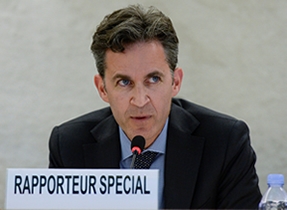
David Kaye, UN Special Rapporteur on Freedom of Expression
Many of the most serious threats to human rights online—like censorship, surveillance, and network shutdowns—are driven by governments, but are often carried out by companies. It is well-established that states have an obligation to protect human rights, but what responsibilities do companies have?
On June 12, UN Special Rapporteur on Freedom of Expression, David Kaye, presented his latest report to the UN Human Rights Council, addressing this question. The report analyzes the human rights responsibilities of internet service providers and telecommunications companies, and draws upon meetings and consultations with private sector and civil society actors, including a written submission from Ranking Digital Rights.
Kaye’s report states that governments should work to protect and promote freedom of expression online, including taking steps to limit companies from interfering with human rights. Government actions, such as surveillance or policies that undermine encryption, can also compel companies to violate human rights.
The report also found that governments and companies are insufficiently transparent with the public about demands being placed on companies and how companies are implementing those demands. “A lack of transparency pervades government interferences with the digital access industry,” according to Kaye.
In some cases, this is due to vague laws that give authorities overly broad powers to shut down networks or prevent companies from publicly disclosing information about government access to user data. However, as the report notes, even if companies are legally prohibited from being fully transparent about how they respond to such government requests, they should seek to disclose the maximum amount of information possible under the law—which, according to RDR’s research, most companies are failing to do. Even more troubling, while companies may be legally obligated to comply with government requests for censorship and surveillance, Kaye’s report cites instances in which companies appear to have gone above and beyond their legal obligations in assisting with government surveillance activities.
Companies should also disclose more information about their own policies and practices that affect individuals’ rights to freedom of expression—such as terms of service, content moderation practices, privacy policies, and data collection practices. They should consult with users, civil society, and fellow companies on best practices for transparency, according to the report. Kaye also observes that multistakeholder engagement allows companies to benefit from external expertise and accountability. Citing RDR’s 2015 Index findings, the report highlights how membership in initiatives such as the Global Network Initiative and the Telecommunications Industry Dialogue often correlates with greater institutional commitments to respecting human rights. Our 2017 Index found even stronger evidence of that correlation with the addition of several more companies.
Governments and corporations each have steps they could take to significantly improve their human rights commitments, and also to improve their overall transparency about how these commitments are actually implemented. As the report notes, internet users “deserve to understand how those actors interact with one another, how these interactions and their independent actions affect us and what responsibilities providers have to respect fundamental rights.”
Read the full report here.
Read RDR’s submission here.




